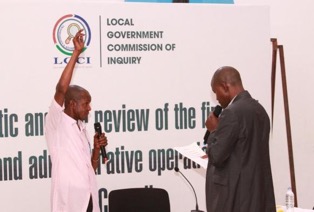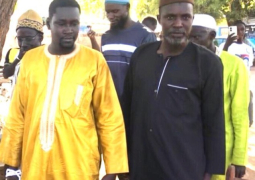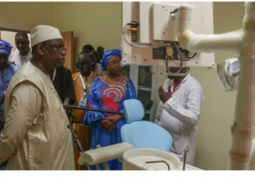
The senior revenue collector of the council made the disclosure on Tuesday before the inquiry probing local government administrations across the nation.
Fatty was on 25 January 2021 given a D20,000 receipt by the Principal Cashier Lamin Kantong Kanteh, but he only deposited D2000. “Where is the outstanding D18,000?” asked Lead Counsel Patrick Gomez. Fatty said he came to know about it in the Commission. “I am surprised,” he added.
“Do you have an explanation?” Counsel Gomez asked. “I don’t. I am just surprised,” Fatty responded.
“You should not be surprised,” Counsel Gomez said. “This was a time you were using the revenue collection device to do collection. The machines record your collections.”
Lead Counsel Gomez told him that on 7 April 2021, he was issued a receipt of D14,800 but only D5,000 was deposited. On 29 April 2021, he was said to have collected D15,000, and in spite of the existence of a receipt, there was no trace of the deposit.
Again, on 23 June 2021, the witness collected D30,000 but only D6,000 was traced. The witness collected D10,000 on 15 February 2021, but there was no trace of the deposit in any of the accounts.
He checked the records and affirmed them as true. The witness claimed that he did not know about the suppression in the past.
“Mr Fatty, what do you mean? You collected revenue and you were supposed to take it to the bank. You decided to take the money and spend it on your own. You stole the money and you know you stole the money. Yet, you want someone to tell you or remind you that you stole,” Counsel Gomez addressed.
Keeping silent for a while, Mr Fatty simple repeated that he was “surprised”.
“Mr Fatty, this only shows a fraction of what transpired. These are just samples,” Gomez added, to which Fatty agreed.
The revenue collector then explained that sometimes he had problems and would expend the council’s funds on his needs. Asked to cite the supposed problems, he later claimed to have expended all these monies on his vehicle.
He said sometimes the principal cashier did not verify their deposits and usually issued receipts to them based on their claims.
“It is not that he does not verify; he is not interested. It is a corruption scheme. Otherwise, there should be no mistakes in this. If you make deposits, it is what the receipt should contain,” stated Counsel Gomez, to which Fatty wholeheartedly agreed.
The senior revenue collector was informed of his habit of collecting funds without going for auditing. Counsel Gomez cited collections of the amounts and dates.
“It is a habit that you have been doing. Do you agree?” Gomez posed.
“Yes, I agree. I know that was a bad habit,” Fatty responded. He also admitted that some of the receipts he obtained from the principal cashier were not appropriate because he was under flat rate collections and such receipts were for other areas.
“It is a fraudulent scheme,” Chairperson Bah interjected. And witness Fatty affirmed.
Read Other Articles In Headlines





